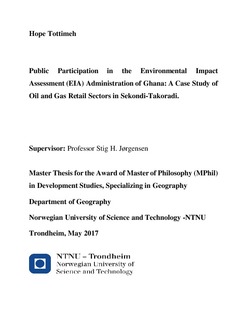Public participation in the environmental impact assessment (EIA) administration of Ghana : a case study of oil and gas retail sectors in Sekondi-Takoradi
Master thesis
Permanent lenke
http://hdl.handle.net/11250/2506120Utgivelsesdato
2017Metadata
Vis full innførselSamlinger
- Institutt for geografi [1108]
Sammendrag
The siting of fuel and gas stations in Ghana embodies a diverse interest of planning problem with inadequate levels of public participation which has witnessed a number of public protest against their location by communities and interested parties. The sector posed a high risk to live and property. The aim of the study was mainly to; 1) assess the level of public participation in the Environmental Impact Assessment (EIA) of oil and gas retail sectors which specifically focused on fuel filling, fuel service, and gas stations; 2) identify the risks posed by fuel and gas stations to individuals and the environment; and 3) examine how power relations influence the permitting and location of fuel and gas stations.
The study applied knowledge mainly from theories; Arnstein ladder of participation, political ecology, political economy and complemented ideas from concepts like Nimbyism, power, participation, environmental justice which were the basis for the analyses. The study employed qualitative methods with data collected through observations and interviews with 4 key informants and 28 primary informants.
The study was conducted in Sekondi-Takoradi metropolis specifically in the neighborhoods of Sekondi, Anagyi, Kasawuradu, Takoradi, Ntankoful, and Fijai. The study reveals that there is an inadequate and ineffective level of public participation in the Environmental Impact Assessment of fuel and gas stations. Some informants indicated that the consultation done by EPA is a mere procedure and does not really represents public interests and desires. The June 3, 2015, fire and flood disaster in Accra the study reveals has increased the risk perception and awareness of many informants on the risk associated with locating fuel and gas stations closed to residential and busy commercial areas. Complex issues of power relations with regard to economic and political power influence the location and the level of risk people are exposed to. The study reveals that economic and politically vulnerable groups are exposed to location risk of fuel and gas station than the rich business and political class with inadequate consideration for general public safety and concerns.
In view of these findings, the study concludes that consultation in the EIA of fuel and gas station should be more effective and comprehensive to make room for public views to be incorporated in the decision-making process devoid of any power influence and technical exigencies. The study is limited in providing a general image of the level of participation, as the EIA requirement and levels of participation are country specific and possibly city specific.
